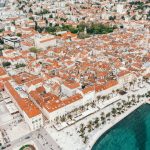ZAGREB, July 27, 2019 – The Social Democratic Party’s (SDP) candidate for President of the Republic, Zoran Milanović, said on Friday that the latest government measures to reduce income tax for people under the age of 30 and lower the VAT rate on tourism services were not a tax reform.
“Something that is done in four steps cannot be a reform. This is just sounding out the situation and it need not end badly. I can understand some of the things that have been done and I welcome them as a continuation of what was begun in January and February 2015, Milanović said, referring to the time when his government was in office.
“This is not a reform, nor do I think that Croatia needs a tax reform. What it needs is constant monitoring and correcting. These are trial-and-error changes. I have to say that there haven’t been many errors so far, but this is a continuation of what was begun in 2015. I can’t see why it was necessary to abolish and then reinstate a lower rate for tourism. Such moves only cause unnecessary uncertainty. If possible, taxes should be reduced. This government has entered into a good inertia for which prerequisites were created before,” he told the press during a visit to the eastern city of Osijek.
Asked what his relationship with Prime Minister Andrej Plenković would be like if he became President, Milanović said that he would not be destructive nor would he spite the government. He also said that he would not seek the prime minister’s resignation. “A President of the Republic should not do that. We saw it five years ago and that’s not good. I won’t be banging my fist on the table. You can’t trust those who say they will, just as you can’t trust them when they say that Croatia will be as rich as Switzerland. But Croatia can be as normal as Switzerland, I can promise that.”
He declined to comment on other presidential candidates “for tactical reasons,” adding that he hoped he would win the race.
Commenting on the death of the first Croatian soldier in Afghanistan this week, Milanović said that the Croatian contingent should be scaled down and that this idea should be discussed. He recalled that when he became prime minister the Croatian contingent in Afghanistan was 350-strong.
“We reduced their number to 50 and now there are 90 of them. I think this number should be reduced because it’s not just that it’s not our war but it’s not NATO’s war either because they also do police work there. It’s an unnecessary risk,” Milanović said.
He recalled that the Croatian army had been present in Afghanistan since 2003 when he was assistant foreign minister, and that he had discussed their deployment with the then prime minister Ivica Račan and foreign minister Tonino Picula.
He said that at the time Croatia was an aspirant for NATO membership and that by deploying its troops to Afghanistan it wanted to show its readiness to assume certain obligations in the alliance.
“In a way I feel responsible for the deployment of Croatian troops there. I will go there, just as (former president) Ivo Josipović and I withdrew Croatian troops from the Golan Heights when they found themselves in danger. A withdrawal of the Croatian troops from Afghanistan is a topic that should be discussed,” Milanović concluded.
More news about presidential elections can be found in the Politics section.








